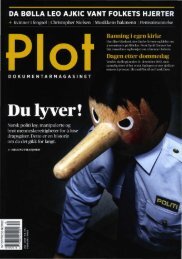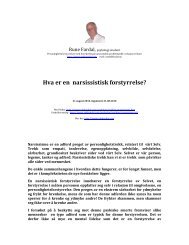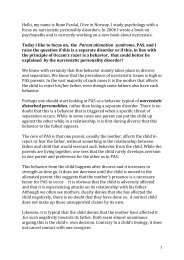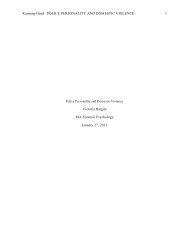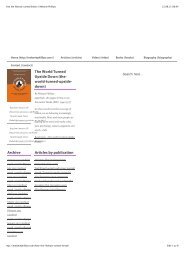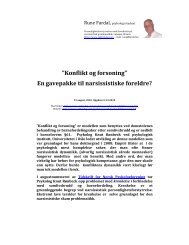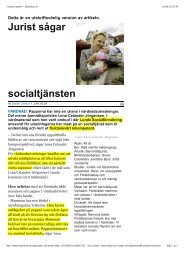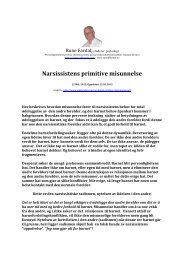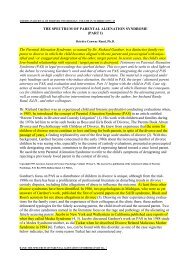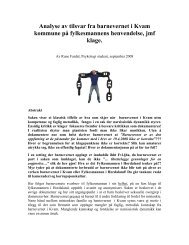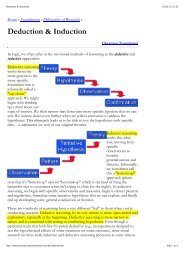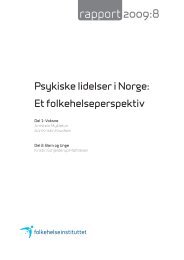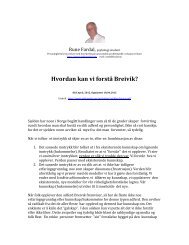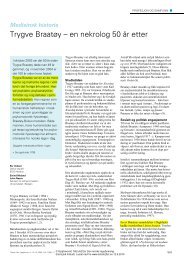The origins of narcissism and narcissistic personality disorder a
The origins of narcissism and narcissistic personality disorder a
The origins of narcissism and narcissistic personality disorder a
Create successful ePaper yourself
Turn your PDF publications into a flip-book with our unique Google optimized e-Paper software.
80 JOHN s. AUERBACH<br />
ages 18 <strong>and</strong> 24 months (Amsterdam& Levitt, 1980; M. Lewis & Brooks-<br />
Gunn, 1979). <strong>The</strong> period between ages 18 <strong>and</strong> 24 months corresponds,<br />
<strong>of</strong> course, with the height <strong>of</strong> the rapprochement subphase, a developmental<br />
period ushered in by the discovery that one is indeed a small<br />
<strong>and</strong> separate being in a large world (Mahler et al., 1975), by the discovery<br />
<strong>of</strong> shame (Amsterdam & Levitt, 1980).<br />
A period <strong>of</strong> relative emotional tempest <strong>and</strong> turbulence, rapprochement<br />
corresponds with the anal phase (or at least toilet training), with<br />
the establishment <strong>of</strong> gender identity (Money & Ehrhardt, 1972), <strong>and</strong><br />
with the emergence <strong>of</strong> a superego or at least <strong>of</strong> evaluative st<strong>and</strong>ards<br />
(Kagan, 1981), the last <strong>of</strong> which is consistent with the beginnings <strong>of</strong><br />
self-reflexive shame at this stage. <strong>The</strong> turbulence <strong>of</strong> this period, on the<br />
traditional account (Mahler et al., 1975), is due to oscillations between<br />
fears that, on the one h<strong>and</strong>, in separating <strong>and</strong> individuating, one will<br />
lose mother <strong>and</strong> be left all alone but that, on the other h<strong>and</strong>, in clinging<br />
to mother, one will be reengulfed by her <strong>and</strong> will lose one’s emerging<br />
autonomy. Because the proposition that infants differentiate from a<br />
fused state <strong>and</strong> are in psychological danger <strong>of</strong> being reengulfed into it<br />
is highly dubious, the present account disregards this hypothesis <strong>and</strong><br />
focuses instead on the experiential states that the traditional perspective<br />
has associated with the new capacity for objective self-awareness.<br />
<strong>The</strong>se include a sense <strong>of</strong> separateness or <strong>of</strong> being distinct from others,<br />
especially from mother (Rothstein, 1979), <strong>of</strong> smallness <strong>and</strong> vulnerability<br />
(Mahler et al., 1975), <strong>and</strong> <strong>of</strong> distress at being unable to measure<br />
up to newly constructed evaluative st<strong>and</strong>ards (Kagan, 1981), all <strong>of</strong><br />
which can be regarded as <strong>narcissistic</strong> injuries. An upsurge in these<br />
feelings, ins<strong>of</strong>ar as they result in disruptions <strong>of</strong> attachments <strong>and</strong> <strong>of</strong> the<br />
sense <strong>of</strong> efficacy, quite easily accounts for the negativistic, willful behavior<br />
<strong>of</strong> the 2-year-old. Issues <strong>of</strong> anality are also likely to be crucial<br />
at this time, if only because anality is associated with shame-filled<br />
experiences <strong>of</strong> defectiveness, dirtiness, <strong>and</strong> loss <strong>of</strong> control (Erikson,<br />
1963). But anality, along with early genital play, becomes a focus <strong>of</strong><br />
toddlers’ negative self-appraisals because it is a focus <strong>of</strong> parental disapproval<br />
(Amsterdam & Levitt, 1980).<br />
In any case, the attempt to ward <strong>of</strong>f feelings <strong>of</strong> shame-that is, a<br />
sense that one is weak, incompetent, defective, dirty, <strong>and</strong> above all<br />
unlovable (Wurmser, 1981)-constitutes the motivational structure underlying<br />
normal <strong>narcissistic</strong> illusions. To limit feelings <strong>of</strong> shame, one<br />
can inflate oneself, proclaim an illusory self-sufficiency, <strong>and</strong> minimize



